Science Fiction Shows of the 1970s: Future Man!!!

The Future Man was an odd little trope in the TV science fiction of the 1970s.
And no, I am not referring to Steve Austin or Buck Rogers. Nor was there any show specifically named Future Man…(*pauses, googling*)… Okay, there was no 1970s show specifically named Future man.
What I am referring to is the various highly evolved men that came back from the future to lecture us about not taking care of the Earth or not ending capitalism or permitting bad things to happen to people because that’s life. They were utterly shocked by racism, they were also invariably white. They usually had some kind of granola-based superpower and were given to “walking the Earth.” Quite often they were amnesiacs.
The Future Man was the spiritual decedent of both Mister Spock and the New Soviet Man. He is not without precedent in science fiction, think of Klaatu in The Day the Earth Stood Still. This trope was pretty heavy on the hippie babble, which isn’t surprising in the least. Boomers like to take credit for ending Vietnam, inventing drug abuse, and landing on the moon, but the fact is they didn’t create any of these things. They did, however, bring us some bad TV shows in the 1970s. I freely grant that they managed to do that.
And the Future Man was big part of 1970s sci fi TV.
There was also another element to Future Man. A strong referent to Ancient Astronauts. For those too young to remember, there was a mania in the seventies for these quasi-angelic beings from the stars. It was kicked off by a book called Chariots of the Gods? (1968). In it, the author Erich von Daniken gathered every known historical anomaly and credited them to aliens that visited Earth at the dawn of time and gave humanity gifts of masonry-based technology that isn’t all that impressive if you have flown across the galaxy for a quick visit. Regardless, von Daniken claimed with perfect conviction that these ancient astronauts built the pyramids of Egypt and Central America, Stonehenge, the Nazca Plains Lines, the Moai statues of Easter Island, and were headquartered on Atlantis. After doing all of these things we could have done for ourselves, the aliens fucked off back into the starry infinite leaving only the Masons to carry out their “plan.”
Today, Chariots of the Gods wouldn’t survive the third reddit comment but in the Seventies it touched off a near religion (*Futureman Herald: I got that one waaaay wrong. There has been a huge revival in this bullshit since I wrote this piece*).
Most of the shows I’m about to reference didn’t last for more than one season or in the case of the first show never got past the pilot episode. Consequently, they didn’t go into syndication because there was a minimum limit of 72 episodes a show had to have before the secondary markets would even sniff at them.
Let’s begin:
Questor Tapes (1974)
Future Man: Questor
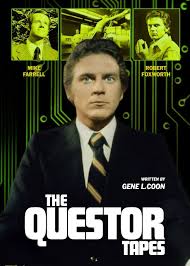
Most of you know I’m not the biggest Gene Roddenberry fanboi out there. But I can certainly give him credit where it’s due. And Futureman is all his fault. While the superior man of Tomorrow had been a staple of pulp sci-fi since Amazing Stories was in its first run, it hadn’t really been seen on TV. Not until Mister Spock came along. Spock was clearly the progenitor of the 1970s Futureman trope. Roddenberry as it turned out was as obsessed with his creation as everyone else was at the time. His first derivative was Gary Seven in the Star Trek episode (and backdoor pilot) Assignment: Earth. When Star Trek was canceled the first project he could get as far as a pilot was Questor Tapes, a TV movie that featured an Android as the Futureman.
Of all the shows here, this one is the closest to good. Gene Roddenberry got the gang back together for this pilot movie. It was based on a book by Star Trek writer (and alleged mistress of Roddenberry) D. C. Fontana. Star Trek show-runner (and the guy who invented seventy percent of Star Trek) Gene L. Coon, wrote the screenplay, hence the quality.
This TV movie was put together by a team that had worked together successfully in the recent past, they were still familiar with each other’s tradecraft. As a self-contained movie, it still works well enough.
An eccentric rich genius and Nobel laureate named Emil Vaslovik began Project Questor, with the intent of creating an android, but he suddenly vanished. A team of super-geniuses is brought together to finish his work. They are able to assemble the Android even though they don’t understand the components they are working with. They have repeatedly studied them and don’t have a clue how to recreate them.
Think about it in terms of the greatest minds of the 1780s trying to reassemble a cruise missile from a detailed set of instructions. They can probably do it and will be able to guess what its function is in broad strokes. But they don’t have a prayer of recreating it and even turning it on will likely be a hopeless task.
One of the things the scientists try to study and end up botching is the androids programming tape. They accidentally erase about half the data. When they finish putting the droid together, they try using a programming tape that they cobbled together themselves. It does nothing.
Doctor Robinson, who was the only member of the team to ever work with Vaslovik, gets them to use original programming tape, damaged as it is. This too appears to be a nothing-burger. But after everyone goes home, the robot hops off the table gives itself some human features then heads off to kidnap Robinson.
Questor has a bit of a problem it seems. He only has half of his memories and Vaslovik built an atom bomb into his power supply to prevent him from being misused. If he doesn’t find Vaslovik in time the bomb goes off.
Fetch Questor!
This, that and the other happens. Eventually, the pair finds Vaslovik in a cave in Mount Ararat, lying on a slab next to him is a long line of bodies on slabs heading deep into the cavern. Vaslovik informs Questor that he himself is an android and that there has been a long series of them going back to the dawn of time when they were left here by “The Masters.” The androids’ mission is to protect and serve mankind. “We protect, but we do not interfere. Man must make his own way. We guide him — but always without his knowledge.” So, yeah, it’s the Prime Directive from Star Trek.
This pilot never went anywhere but Roddenberry absolutely could not give up on this concept. Questor’s biggest problem was his lack of emotions, he was supposed to have them and they were in the tapes that got erased. Part of Robinson’s job was to help guide the android as he developed them. There were a couple of robot cop shows that Roddenberry tried to launch with this same motif. As you have already figured out Questor was eventually reincarnated as Data.
Final Note: Questor could have sex with women because “I am fully functional in every way.” This is the one part that I am absolutely certain that Gene Roddenberry injected. If you watched Star Trek the Next Generation that line is probably familiar to you.
Where to Watch: DVD. It is heavily policed on YouTube, (because it has Roddenberry’s name on it, there are occasional talks to revive it).
Man From Atlantis (1977)
Future Man: Mark Harris
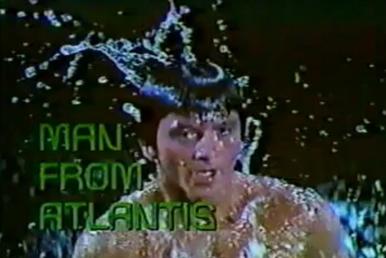
If Questor Tapes was good by 1970s standards, then Man From Atlantis was good by no standards at all.
It starred Bobby Ewing and lasted only half a season. The lead actress, Elizabeth J. Montgomery was out of the credits in the last two episodes because she hired a lawyer to get her out of her contract. It was that good of a show.
The setup was that a man with webbed hands and feet plus, some hieroglyphs on his swim trunks is found on the beach after a storm. It turns out he’s both an amnesiac and an amphibian. He spoke without using contractions because that automatically makes him mysterious and powerful.
He goes to work for the aquatic scientific agency that found him in the pilot, and they would have weekly underwater-themed adventures. If I remember right, he disapproved of pollution.
It wasn’t a terrible idea, but they did terrible things with it. The writers didn’t have the slightest clue what to do with the concept. In one episode Mark traveled back in time and met a doppelganger of himself who was a gunfighter in the old west. He’d cut off the webbing between his fingers and spoke with contractions thus proving he was evil. In another episode, he traveled into play, Romeo and Juliet and kept them from killing themselves. I think that was the point where Belinda J. Montgomery decided this show was literally too stupid to be a part of and hired a lawyer to get her out of it.
The only thing that was worth watching was the recurring villain played by Victor Buono. He’d do stuff like, melt the polar caps.
If you watch this show at all stick with the episodes with Victor.
Final note: The Chinese absolutely LOVED it! Admittedly, it was the first thing from America they ever got to watch but they did indeed love it. Han Gen-Xers will grin when you bring it up.
Where to Watch: DVD. You can buy it on Prime Video, (it’s ten bucks cheaper but absolutely not worth it). Forget about YouTube, it is heavily policed, (did I mention it was popular in China?)
Fantastic Journey (1977)
Future Man: Varien
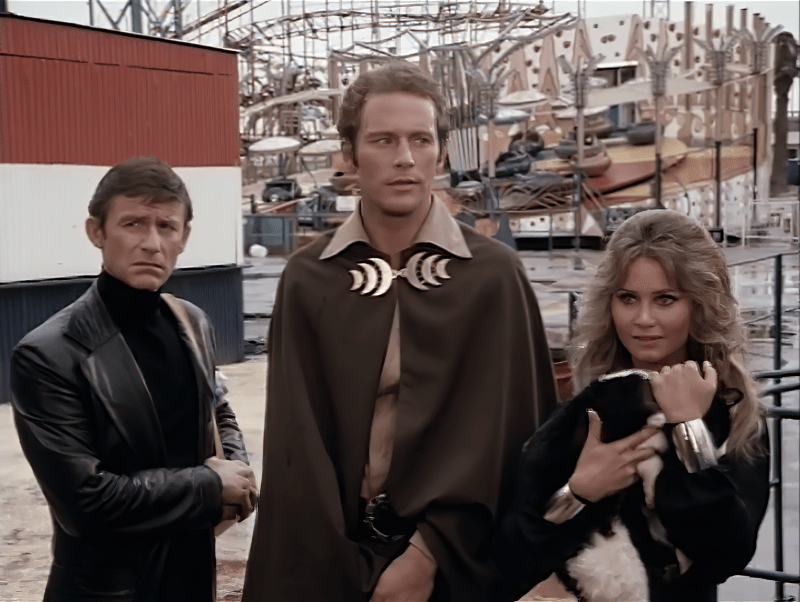
It’s no secret that TV executives didn’t like science fiction in the 1970s. Everybody remembered how much money got blown on Star Trek, the sets and costumes all had to be custom-made, special effects took forever, and weren’t cheap. Besides, it all felt like kid stuff to these middle-aged New Yorkers with living memories of the fall of Berlin.
Greatest Generation TV executives liked cop shows, hospital shows, family sitcoms, and comedy/variety hours. You could tell because on the rare occasions that a science fiction show would be greenlit they would try and jam those things into them. Remember Ray Bolger as the singing-tap-dancing robot in Battlestar Galactica?
But in 1977 George Lucas changed everything. Whether TV execs personally liked science fiction or not, they ordered their people to start going through the pitches they’d shot down.
Old Timey TV Exec: Whatever you’ve got. I’ll take it. We got to move on this sci-fi crap.
1970s Programmer: Well there is a thing called Battlestar Galactica.**
Old Timey TV Exec: Sounds stupid and childish. Just what we are looking for.
1970s Programmer: It will cost $20 million to make.
Old Timey TV Exec: AAAAHHHHHHHRRRRRRGGGGGHHHH!!!!
1970s Programmer: O-r-r we could do this Star Trek kind of thing. Well, more like Earth Trek. We don’t need to bother with spaceship special effects, and we can reuse some sets and costumes from Logan’s Run. It should be a lot cheaper. It’s about a group of…
Old Timey TV Exec: Shut up! You had me at a lot cheaper. Greenlit!
And it really was Star Trek on Earth. D. C. Fontana was the producer and showrunner. It definitely had the Star Trek vibe throughout.
The setup was that a scientific expedition goes into the Bermuda Triangle.
And I see, I forgot to mention that the Bermuda Triangle figured heavily into the Chariots of the Gods cliches. Trust me, it did. Erich von Daniken didn’t explain what went on there, actually, he didn’t explain anything in his book, it was all one big J.J. Abrams-style mystery box. He just gave vague hints about alien vortexes and listed the tonnage lost and aircraft that have disappeared there, and said nothing about explanations involving well-known water hazards and a history of rampant piracy.
The pilot starts off with Flight 19 vanishing. Okay, given the era, it set the tone effectively. Then, a present-day (meaning the mid-seventies) “scientific expedition” to the Bermuda Triangle sets off. I’m not sure what they were trying to “science,” but I suppose it wasn’t difficult to get funding for anything with “Bermuda Triangle” in the grant proposal in the mid-seventies. Good for them!
The show started off with a scientist-man father, his son who had been in a bunch of Disney flicks, a black doctor, and The Woman. So, it was seventies diverse. By the end of the pilot, the scientist-man father was out of the show. Understandable, he didn’t serve much of a purpose once Future Man: Varien was introduced. Varien was super smart and could “sense things.” He also had a glowing tuning fork that did whatever the plot needed it to. Basically, a sonic screwdriver that looked like it had actual sonic capabilities. The Woman was replaced by a hotter The Woman who was the daughter of an alien and an Atlantean.
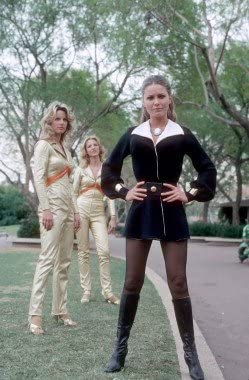
Roddy McDowall was introduced as another scientist from the 1960s. His job was to chew the scenery and he was happy to do so.
The team would reach some portal location and be beamed into a zone where they would have that week’s adventure. And at the end of the episode would be beamed out when they reached the next portal. They were looking for the one that would take them home. As I said, it was basically Earth Trek.
It really wasn’t bad as these things go. It had room for improvement to be sure but it was trying to improve. However, it had two very big problems. It was in a suicide timeslot sandwiched between the Waltons and Welcome Back Kotter. And it was also frequently preempted, that was ratings death back then.
Final Note: The production team, minus the cast, reassembled the next year for the TV version of Logan’s Run. Another EarthTrek show if ever there was one.
Where to watch: DVD and some bad VHS transfers on YouTube. It is not policed.
The Phoenix (1982)
Future Man: Bennu of the Golden Light (*sigh* NO, I’m not shitting you that was really his name.)
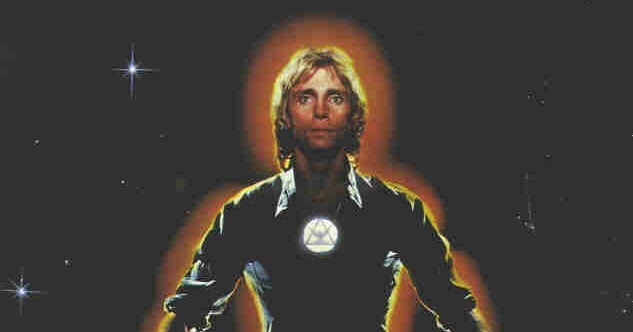
I know I said, seventies science fiction shows. However, this little obscurity fits the Future Man trope so well I had to include it. Also, the pilot was developed in 1979 even if it wasn’t aired until 1981.
The setup is that Bennu (Judson Scott) is an ancient alien found under a Mayan tomb. He had been there for better than a thousand years. He has various mental powers that are typical of a Jedi knight but instead of a lightsaber, he has a horking big New Age amulet.
He is an amnesiac (this again), but he knows he has to find his woman/partner/wife(?) Mira. She can fill him in on what his mission is on Earth.
He has two antagonists. One is an evil alien named Yago, whose dark powers come from a bracelet instead of an amulet. In the show’s bible, he was explicitly compared to Lucifer.
The other is a government agent and former POW played by career-heavy, Richard Lynch. This second-running plot line was more like the old Fugitive TV show. Presumably, the agent would have eventually discovered that Bennu was for real and taken his side, but the show didn’t get that far.
The Phoenix was super heavy into the Ancient Astronaut’s tropes during the pilot. While it was pretty hippyish, it wasn’t a bad show. Believe it or not, the problem it had was that it did NOT stick with the hippy mumbo-jumbo. It quickly slid into the standard problem of the week tropes that weren’t any different from the Incredible Hulk’s (which was just finishing its own run because it had run out of ideas).
Final Note: This show was definitely a blink and you’ve missed it. It was only on for four episodes before ABC pulled the plug. I didn’t even know it existed until it showed up on Sci-Fi channel back when they were regularly showing episodes of She-Wolf of London.
Where to watch: YouTube and that’s it.
Galactica 1980
Futureman: Doctor Zee

Battlestar Galactica was seriously into Chariots of the God? Tropes. The character names, the Egyptian-inspired flight helmets, the costuming, and the lore. A certain degree of spacey quasi-religious overtones was in a post-Star Wars world, unavoidable. Adama was more of a Moses figure than a military leader. There were also angelic and demonic figures present from time to time. The very Sauron like Count Iblis is an excellent example.
Battlestar Galactica was the first major science fiction show since Star Trek and holy cow it cost a packet to make at $20 million a season. That was bankrupt-the-studio money back then. It had originally been pitched as a series of mini-series. It would have come on once a year for a week and cleaned up in the ratings during sweeps month. That would have been smart. Instead, the network execs defaulted to a weekly show with 22 episodes. Given the expense, it never stood a chance. Particularly, when they moved it to Sunday nights at 8:00, that guaranteed ratings death when it started getting preempted during football season.
Given the cost, it was doomed from the start as a weekly.
However, two years after it was shitcanned a bizarre little sequel suddenly popped up called Galactica 1980. The name tells you right there they didn’t think it would last more than a year and it didn’t. Its appeal to the network was cost. Where Battlestar had been lavishly funded, Galactica 1980 was made on the loser-cheap. It was a half-season mid-season replacement. The costumes and props were already made, there was plenty of effects footage that could be recycled, and since it was taking place on Earth they didn’t need to worry about building sets. There was no way they could afford to rebuild the original bridge anyway but that was what stock footage was for. The only carryovers from the cast were Adama and Boomer, everybody else was gone.
However, there was one new addition to the cast, Robbie Rist as Doctor Zee. Robbie Rist was an in-demand child actor in the 1970s. He got called in to be the cute kid when kids on family sitcoms aged out of their “cute years.” He was the Cousin Oliver on the Brady Bunch. These kind of roles were such a thing for him that he created the Cousin Oliver trope. By 1980 Rist had aged out of Cousin Oliver roles.
So Doctor Zee was new ground for him. Honestly, he wasn’t bad at it. The kid delivered as the mysteriously powerful child intellect, usually shot through fog filter to make him look mysterious. Aside from stupendous intellect, other powers were hinted at. Among these was apparently polymorph-self because Doctor Zee turned into another actor after the third episode. Originally, Zee was supposed to be the child of Starbuck and a seraph, but the script got changed to make him kind of a stepkid. Weak.
Galactica 1980 was dead before the last episode aired but I will grant the one with Starbuck was the best of the series.
Where to watch: Why the hell would you want to?
The Hippie-Dippie space Jesus that was Futureman died in the 1980s pretty much overnight. Generation X wasn’t remotely interested in him.

